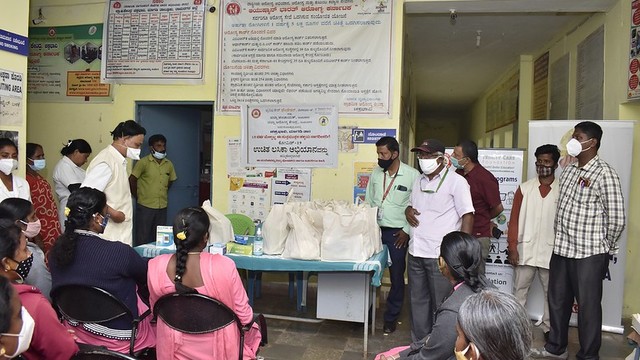Civil society organisations in the global South and disruptive change: implications for funders
Southern civil society organisations increasingly face numerous disruptive forces and are often effective sources of necessary disruption themselves. Halina Ward and Tom Bigg explore how funders can support these organisations in ever more uncertain times.



Europeans believed that swans were always white; a black swan was impossible - then black swans were discovered in Australia. Now "black swan" is a term for a highly unexpected event (Photo: Pete Jordan, Creative Commons via Flickr)
Over the last year and a half or so, the IIED has been working to understand how leaders of civil society organisations (CSOs) in the global South engage with disruptive change that impacts their organisations. Flexible funding is crucial for supporting Southern CSOs as they experience and try to get good (or better) at responding to such change; IIED's new report looks at the implications for funders.
Change is constant
It's abundantly clear that in today's uncertain times, CSOs in middle- and low-income countries in the global South are confronting multiple disruptive forces. These range from natural disasters and migration to a turbulent funding and changing regulatory environment, as civil society space across much of the world contracts.
For many, disruptive change is already a daily fact of life.
The organisational disruption brought about by these forces doesn't just hamper the effectiveness of these CSOs now; it can also stifle their ability to address bigger shifts in the development landscape that are themselves disruptive in positive ways.
This also weakens CSOs' capacity to deliver on the Sustainable Development Goals (SDGs) mandate to ensure that 'no-one is left behind'.
Flexible support needed
Foundations and other donors who fund CSOs in the South should do more to support organisations to engage with disruptive change; whether it's as 'disrupted' or 'disruptive' innovators in their own right.
Funders must respond to disruptive change with greater support for CSOs' organisational skills, systems and capabilities. This puts an even higher premium on already scarce flexible funding to help organisations develop and implement strategies. It also means grant decisions must be informed by a deeper understanding of the on-the-ground operational realities of disruption.
To survive, CSOs in middle- and low-income countries need access to resources. But more than simply allowing organisations to survive, these funds, if allocated effectively, can enable Southern CSOs to thrive.
Funders could also usefully ask whether their own strategies and practices accelerate, or hinder, the development of 'disruption-ready' characteristics within grantees.
Messages for grant-makers
The report highlights at least four key messages for grant-makers:
- Fund flexibly, because organisational flexibility is key to an effective disruptive change approach.
- Explore whether you need new capabilities to proactively support 'disruption-ready' organisational qualities: because an emphasis on 'disruption-readiness' is likely to demand investment in the internal skills and capacities needed for funders to make sound judgments about organisations rather than projects or programmes.
- Invest in shared learning because shared learning on internal skills and capacities as well as emerging best practice is a crucial resource for CSOs and funders alike.
- Review intermediation: this is the term applied to describe (among other things) the process of getting funds to Southern CSOs via intermediary organisations, often international NGOs based in the global North. Funders supporting international NGOs could begin to reflect on how grantees’ approaches help partners that are experiencing disruptive change.
As a starting point, there's a case for providing explicit incentives for finance provided to international NGOs for learning or organisational development, to be shared with CSO grantees in middle- and low-income countries.
Grant-makers who are distant from on-the-ground realities in the South could also consider engaging more closely with community foundations in middle- or low-income countries as re-granting intermediaries. This area also has a rapidly evolving community of practice.
Learning from the ground
A recent gathering of community foundations in Johannesburg brought together representatives from more than 60 countries. Although from hugely diverse contexts, all asserted the benefits from philanthropy that shifts power to ground level, and viewed it as an integral part of community efforts to improve livelihoods and wellbeing.
Three observations which resonated strongly with participants also contain important insights for funders who want to support Southern CSOs get good (or better) at disruption:
- During the struggle against apartheid, South African activists felt their international funders were 'in the trenches' with them. How could funders recapture that sense of common purpose and shared values? Growing threats to CSO operating space and voice may help make the case for more overt solidarity with the real struggles now under way.
- Only 0.2 per cent of humanitarian aid goes directly to Southern organisations. Much can be learned from nationally-pooled funds that are managed by consortiums of local CSOs and community foundations: they can provide the necessary oversight while also giving more autonomy to independent CSOs, allowing them to invest in institutional capacity.
- 'Assets' are much broader than just money. Local foundations can play a crucial trust-building role, often with very small budgets, as institutions that oil the wheels of civil society and bring people together around a shared purpose.
Do get in touch if you're a funder interested in exchanging ideas on this important issue with Southern CSO leaders; there's a huge amount to learn along the way.
Halina Ward (halina@halinaward.co.uk) is a senior associate and Tom Bigg (tom.bigg@iied.org) is head of the Strategy and Learning Group at IIED.



